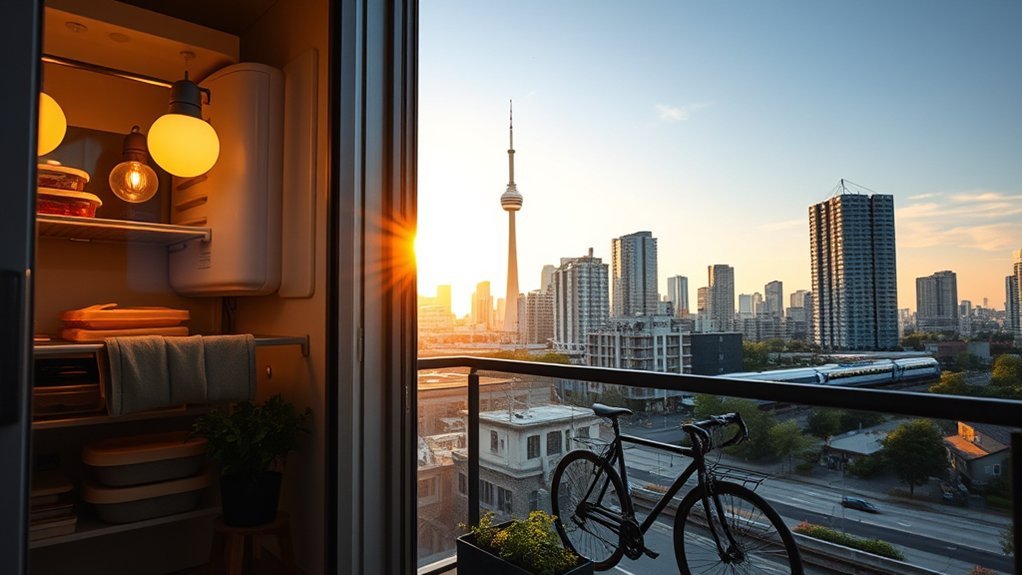You’ll need roughly CAD 3,500–4,500 a month to live comfortably in Toronto. Expect one‑bed rents around CAD 2,127 outside downtown and CAD 2,534 downtown; buying costs range from about CAD 349,000–699,999 depending on location. Plan CAD 350–400 for utilities and internet, transit about CAD 156 monthly, and groceries/food that can push totals higher. Movers, insurance and dining habits add variability, and the sections below show ways to trim costs and compare options.
Housing Prices, Rent Ranges and Buying Costs

Wondering what housing will cost you in Toronto? You’ll find Toronto rent is high and the Toronto housing market is extremely competitive, so you’ll need quick decisions and clear budgets. One-bedroom rent in downtown Toronto averages about CAD 2,534/month, while outside-center rent runs near CAD 2,127/month, reflecting tight rent ranges across neighborhoods. If you’re buying, downtown one-bedroom buying costs span roughly CAD 459,000–699,999, versus about CAD 349,000–599,999 outside downtown. Factor mortgage costs into your buying calculations—rates and down payment size will materially affect monthly obligations. Moving costs also matter: average downtown moves use two movers and a truck, with hourly mover rates between CAD 139 and CAD 199, so plan for several hours plus tips. Compared with many cities, Toronto’s housing prices and rents are well above average, so prioritize location, timing, and affordability metrics when choosing whether to rent or buy.
Utilities, Internet and Monthly Service Expenses

How much will you pay each month beyond rent? You should budget roughly CAD 350–400 for utilities and monthly costs in Toronto alquiler scenarios, which typically bundle basic utilities, gas, internet and mobile plan charges. Basic utilities for an 85m² apartment average about CAD 161 — that covers electricity, heating, water and garbage when included; some buildings bill separately. Internet service runs about CAD 56–100 depending on speed and provider. Mobile plan costs vary by data and carrier and can materially affect your total. Season, rental arrangement and provider choices influence bills: heating spikes in winter, electricity varies with usage, and bundled packages can lower fees. Track individual invoices so you know whether gas, water or internet is itemized. Additionally, be mindful of cost implications when budgeting for unexpected service changes or outages. Use the table below to compare typical monthly amounts and plan accordingly.
| Item | Typical Range (CAD) | Notes |
|---|---|---|
| Basic utilities | 161 | Electricity, heating, water (varies) |
| Internet service | 56–100 | Depends on speed/provider |
| Mobile plan | 30–80+ | Varies by data needs |
Grocery and Dining Costs (Eating In and Out)

Eating in Toronto will take a predictable chunk of your monthly budget: groceries and dining combined commonly push food costs well above what many expect, given a single person’s total monthly outlay around CAD 4,046 and restaurant prices ranging widely (a mid-range dinner for two runs about CAD 75–220).
You’ll find grocery shopping can be economical if you plan: basic staples cover a large share of food spend, but imported items and specialty shops raise your basket quickly.
Dining out varies — a restaurant meal ranges from casual cheap eats to pricier venues — so limit nights out if you’re balancing Toronto rent and 85m² utilities costs.
Expect a Cappuccino price between CAD 2.99–7.50 and a beer price around CAD 8 for a 0.5L draught, which add up over weeks.
Additionally, careful financial planning can help you manage grocery and dining expenses effectively.
Factor groceries and dining into your overall cost of living alongside city center rent and monthly utilities to keep budgets realistic.
Transportation, Insurance and Commuting Costs

Curious what commuting and transport will add to your monthly bills? You’ll want to factor transportation into Toronto rent and utilities discussions because commuting costs can materially affect your monthly costs. TTC fares run about $3.35 per single ride; using PRESTO you can buy a day pass at $13.50 or a monthly transit pass around $156, which is often the most economical if you commute daily. If you travel to the airport or suburbs, UP Express and GO Transit add extra fares—budget accordingly for occasional regional trips. Utilities for an 85m² apartment average about $161, but combined monthly bills often reach $350–$400, so include those alongside transit. Insurance (tenant or auto) varies, but expect it to be an added fixed cost to your budget. When you compare neighborhoods, weigh higher Toronto rent near downtown against potential savings from shorter commutes and lower commuting costs. It’s also wise to regularly inspect your air conditioning performance to ensure your vehicle remains comfortable during hot summer months.
Budgeting by Household Type: Single, Couple, Student and Family

Wondering what your monthly budget should look like in Toronto? You’ll base it on household type and the housing market: a single person faces about CAD 4,046 monthly expenses with Toronto rent near CAD 2,534; a family of four averages CAD 9,982 with roughly CAD 4,445 in rent. Utilities add CAD 350–400. Transit (PRESTO CAD 156/month) and everyday costs change totals.
| Household | Typical monthly snapshot |
|---|---|
| Single person | CAD 4,046 total; rent ~CAD 2,534; utilities CAD 350–400; transit CAD 156 |
| Couple | Expect ~CAD 5,500–7,000 depending on rent and shared utilities |
| Student | Lower if shared housing; rent CAD 1,800–2,700 depending downtown vs outside downtown; transit CAD 156 |
| Family of four | CAD 9,982 total; rent ~CAD 4,445; higher food and utilities |
Use these figures for practical budgeting, tracking rent, utilities, transit and other monthly expenses tied to Toronto’s cost of living.
Cost-Saving Strategies and Affordable City Alternatives

Looking to cut monthly costs without sacrificing lifestyle? Focus first on housing costs: moving from a city-center 1-bedroom (≈CAD 2,534) to outside-center (≈CAD 2,127) trims rent and lowers your overall cost of living.
Cut monthly costs without sacrificing lifestyle: start by moving from a downtown 1‑bedroom (≈CAD 2,534) to outside-center (≈CAD 2,127).
Recalculate your budget to include average utilities (CAD 350–400) and adjust lifestyle choices—groceries and dining push Toronto’s expenses higher.
Use transit strategically: if you commute often, a PRESTO Monthly Pass (CAD 156) beats single fares (CAD 3.35) and day passes (CAD 13.50) for predictable transit costs.
For deeper savings tips, consider shared housing, smaller units, or suburbs with lower rent and comparable transit links; these affordable city alternatives can cut monthly expenses substantially.
Shop bulk, set utility usage targets, and track recurring subscriptions.
If you’re a family, rework housing and transport allocations—moving modestly outward often delivers the biggest drop in monthly expenses while keeping access to Toronto’s services and jobs. Additionally, financial planning for other expenses, like gym memberships, can further enhance your savings.
Frequently Asked Questions
How Much Do Utilities Cost per Month in Toronto?
You’ll typically pay about $350–$400 monthly for utilities in Toronto, covering basics like electricity, heating, gas, internet, and mobile; bills rise in winter and can vary by apartment size, usage, and whether utilities are included.
How Much Does It Cost to Live in Toronto With Rent?
You’ll pay roughly CAD 4,046 monthly as a single (about CAD 2,534 rent downtown, CAD 2,127 outside), and about CAD 9,982 for a family of four (around CAD 4,445 rent), plus utilities roughly CAD 161–400.
Is $50,000 Enough to Live in Toronto?
Yes — you can live on $50,000 in Toronto, but you’ll need to budget tightly. Expect limited savings, choose cheaper neighbourhoods or roommates, and control utilities, food, transit, and discretionary spending to stay solvent.
How Much Money Do You Need to Live Comfortably in Toronto?
You’ll need roughly CAD 4,000–6,000 monthly as a couple and about CAD 7,500–10,000 for a family of four; solo comfortable living typically requires around CAD 4,000 monthly, implying ~$100,000+ annual household income.
Conclusion
You now have a clear snapshot of Toronto costs—rent, utilities, food, transport and budgeting by household. Use the data to plan realistically: prioritize essentials, compare neighbourhoods, and lock in cheaper subscriptions. If you’re flexible on location and timing, you can trim expenses without sacrificing quality of life—don’t throw good money after bad. With disciplined tracking and smart trade-offs, you’ll keep costs predictable and meet your goals in this pricey city.


